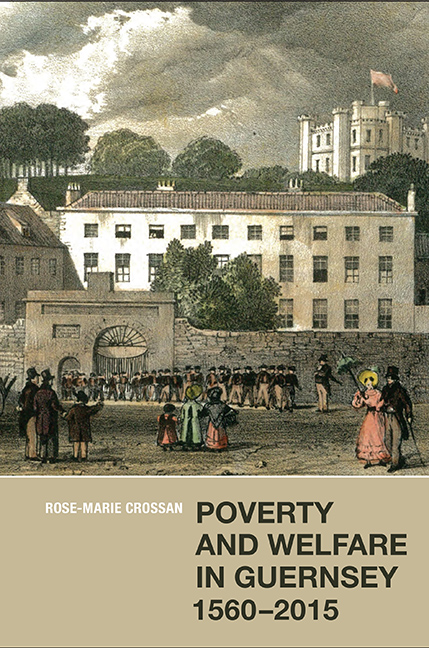Book contents
- Frontmatter
- Dedication
- Contents
- List of Illustrations
- Acknowledgements
- Abbreviations
- Conventions, Note on curren
- Maps
- Introduction
- I Context
- II Welfare
- III Town Hospital
- IV Twentieth Century and Beyond
- Conclusion
- Appendix 1 Writings on Peasant Proprietorship in Guernsey
- Appendix 2 Poor Rates, Indoor and Outdoor Relief Spending, St Peter Port, 1724–1924
- Appendix 3 Parochial Poor Relief in Other Channel Islands
- Appendix 4 Average Year-end Head-counts and Average Annual Admissions and Discharges, Town Hospital, 1700s–1900s
- Appendix 5 Adult Admissions Ascribed to Illness and Accidents, Town Hospital, 1852–1919
- Appendix 6 Relative Proportions of Men and Women in Year-end Head-counts and Annual Admissions, Town Hospital, 1750–1919
- Appendix 7 Annual Averages of Child Admissions and Year-end Numbers, Town Hospital, 1756–1919
- Appendix 8 Over-60s as a Proportion of all Inmates, and Composition by Sex of Over-60s Cohort, Town Hospital, 1756–1911
- Appendix 9 Average Weekly Amounts Purchased per Head, Town Hospital, 1760–1917
- Appendix 10 Timeline: Developments in Poor Relief and Social Security, 1700–2010
- Bibliography
- Index
4 - Outdoor Relief, Mid-Eighteenth to Mid-Twentieth Centuries
Published online by Cambridge University Press: 18 June 2021
- Frontmatter
- Dedication
- Contents
- List of Illustrations
- Acknowledgements
- Abbreviations
- Conventions, Note on curren
- Maps
- Introduction
- I Context
- II Welfare
- III Town Hospital
- IV Twentieth Century and Beyond
- Conclusion
- Appendix 1 Writings on Peasant Proprietorship in Guernsey
- Appendix 2 Poor Rates, Indoor and Outdoor Relief Spending, St Peter Port, 1724–1924
- Appendix 3 Parochial Poor Relief in Other Channel Islands
- Appendix 4 Average Year-end Head-counts and Average Annual Admissions and Discharges, Town Hospital, 1700s–1900s
- Appendix 5 Adult Admissions Ascribed to Illness and Accidents, Town Hospital, 1852–1919
- Appendix 6 Relative Proportions of Men and Women in Year-end Head-counts and Annual Admissions, Town Hospital, 1750–1919
- Appendix 7 Annual Averages of Child Admissions and Year-end Numbers, Town Hospital, 1756–1919
- Appendix 8 Over-60s as a Proportion of all Inmates, and Composition by Sex of Over-60s Cohort, Town Hospital, 1756–1911
- Appendix 9 Average Weekly Amounts Purchased per Head, Town Hospital, 1760–1917
- Appendix 10 Timeline: Developments in Poor Relief and Social Security, 1700–2010
- Bibliography
- Index
Summary
Insular framework
General considerations
The mid-eighteenth-century founders of the Town and Country Hospitals had hoped that their institutions would obviate any future need for outdoor relief. However, practical considerations ensured that this form of relief did not cease, and indeed continued to be dispensed by Guernsey's parishes for the next 250 years. Since the nature of outdoor relief differed between St Peter Port and the country parishes, the relief regimes of town and country will be analysed separately. There was, nevertheless, an all-island framework under which all parishes nominally operated, so we will begin with an examination of this.
Unlike in England and Wales, the law played a minimal part in Guernsey's poor relief framework. In the former jurisdiction, the relief system had been created by statute, and was subject to legal oversight, so that, by the late 1700s, a compilation of poor law statutes and judicial decisions filled three volumes. In Guernsey, by contrast, most poor-related ordinances passed between the sixteenth and eighteenth centuries were ad hoc and temporary, forgotten once the problems which had given rise to them had passed, only for similar ordinances to be issued when new problems arose. As late as the mid-nineteenth century, there was no single reference source for any of Guernsey's ordinances. A Royal Commission investigating the island’s criminal law in 1846 observed that ordinances were ‘scattered about’ in all sorts of registers, and not ‘properly collected’. Only after the Royal Commission's visit was an effort made to compile past ordinances, and even then the compilations were far from exhaustive. In the absence of any poor law digests or compendia up to this point, there cannot be said to have been a gradually accumulating body of poor law in the English sense.
Instead, the day-to-day administration of parochial welfare was based on unwritten custom. At our mid-eighteenth-century starting point, each parish had a number of unpaid officers with poor relief responsibilities: Collecteurs, six in St Peter Port and four in the country parishes, who took collections and worked directly with the poor; and the Procureur, who represented parish interests in dealings with other bodies and exercised general supervision over poor relief matters. These officers, who had periodically to submit their accounts for public audit, were elected for varying terms by parochial Chefs de Famille. Their work extended only to the native poor.
- Type
- Chapter
- Information
- Poverty and Welfare in Guernsey, 1560-2015 , pp. 60 - 96Publisher: Boydell & BrewerPrint publication year: 2015



